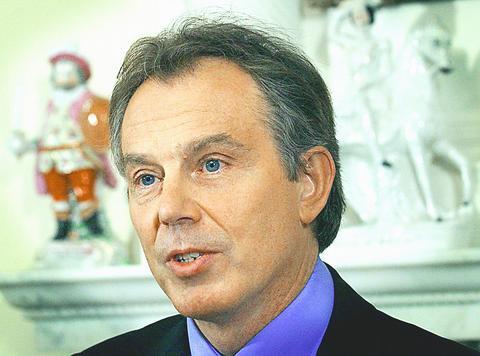British Prime Minister Tony Blair tried to bridge the trans-Atlantic rift over Iraq, urging a "fractured, divided and uncertain" world to unite in the wake of US President George W. Bush's election victory.
Blair, Bush's strongest international ally in the invasion of Iraq, congratulated the president on his re-election -- and tried to nudge him toward re-engaging with the stalled Middle East peace process.

PHOTO: AP
Speaking on Wednesday at his 10 Downing Street office after talking to Bush by phone, Blair said working toward Israeli-Palestinian peace was "the single most pressing political challenge in our world today."
"Therefore we must be relentless in our war against terrorism and in resolving the conditions and causes on which the terrorists prey," Blair said. "We should work with President Bush on this agenda. It is one which all nations of goodwill would surely agree."
Those remarks appeared aimed at Britain's European neighbors, many of whom opposed the US-led invasion of Iraq and were wary of a second Bush presidency.
Bush's perceived unilateralism, his refusal to sign the Kyoto Protocol on global warming, his rejection of an international criminal court and the incarceration of detainees at the US military base in Guantanamo Bay, Cuba, also have also to his unpopularity among Europeans, including many Britons.
Blair said Bush's re-election "comes at a critical time. A world that is fractured, divided and uncertain must be brought together to fight this global terrorism in all its forms, and to recognize it will not be defeated by military might alone."
The unswerving loyalty of the centrist Blair to the right-wing Republican Bush has angered many Britons, especially among left-wing sections of the governing Labour Party. Many Britons believe Blair slavishly follows US foreign policy without exerting real influence, and he is frequently mocked as Washington's poodle.
Blair tried to dispel that image on Wednesday, painting the trans-Atlantic relationship as a two-way street. While pledging support for the US-led war on terror, Blair also stressed the importance of bringing democracy to Iraq, as in Afghanistan, and to fighting poverty and injustice in Africa and elsewhere in the world. And Blair called for renewed commitment to Israeli-Palestinian peace.
It is widely assumed in Britain that Blair backed Bush over Iraq in return for a pledge that Washington would push harder for peace in the Middle East.
The "road map" peace plan for Israel and the Palestinians put forward by Bush last year has largely stalled.
Blair said he "have long argued that the need to revitalize the Middle East peace process is the single most pressing political challenge in our world today."
Blair's remarks were echoed by Egyptian President Hosni Mubarak and German Chancellor Gerhard Schroeder, who appealed to the US to push for the "road map" plan.
After meeting with Mubarak in Bonn, Schroeder said peace efforts would go more smoothly with cooperation from Europe, Russia "and above all, the United States of America, so that this process can be implemented better."
Blair called on Europe and the US to "build anew their alliance" in the wake of Bush's victory.
"All of us in positions of leadership, not just President Bush, have a responsibility to rise to this challenge. It is urgent that we do so," Blair said.

A fire caused by a burst gas pipe yesterday spread to several homes and sent a fireball soaring into the sky outside Malaysia’s largest city, injuring more than 100 people. The towering inferno near a gas station in Putra Heights outside Kuala Lumpur was visible for kilometers and lasted for several hours. It happened during a public holiday as Muslims, who are the majority in Malaysia, celebrate the second day of Eid al-Fitr. National oil company Petronas said the fire started at one of its gas pipelines at 8:10am and the affected pipeline was later isolated. Disaster management officials said shutting the

US Vice President J.D. Vance on Friday accused Denmark of not having done enough to protect Greenland, when he visited the strategically placed and resource-rich Danish territory coveted by US President Donald Trump. Vance made his comment during a trip to the Pituffik Space Base in northwestern Greenland, a visit viewed by Copenhagen and Nuuk as a provocation. “Our message to Denmark is very simple: You have not done a good job by the people of Greenland,” Vance told a news conference. “You have under-invested in the people of Greenland, and you have under-invested in the security architecture of this

Japan unveiled a plan on Thursday to evacuate around 120,000 residents and tourists from its southern islets near Taiwan within six days in the event of an “emergency”. The plan was put together as “the security situation surrounding our nation grows severe” and with an “emergency” in mind, the government’s crisis management office said. Exactly what that emergency might be was left unspecified in the plan but it envisages the evacuation of around 120,000 people in five Japanese islets close to Taiwan. China claims Taiwan as part of its territory and has stepped up military pressure in recent years, including

UNREST: The authorities in Turkey arrested 13 Turkish journalists in five days, deported a BBC correspondent and on Thursday arrested a reporter from Sweden Waving flags and chanting slogans, many hundreds of thousands of anti-government demonstrators on Saturday rallied in Istanbul, Turkey, in defence of democracy after the arrest of Istanbul Mayor Ekrem Imamoglu which sparked Turkey’s worst street unrest in more than a decade. Under a cloudless blue sky, vast crowds gathered in Maltepe on the Asian side of Turkey’s biggest city on the eve of the Eid al-Fitr celebration which started yesterday, marking the end of Ramadan. Ozgur Ozel, chairman of the main opposition Republican People’s Party (CHP), which organized the rally, said there were 2.2 million people in the crowd, but